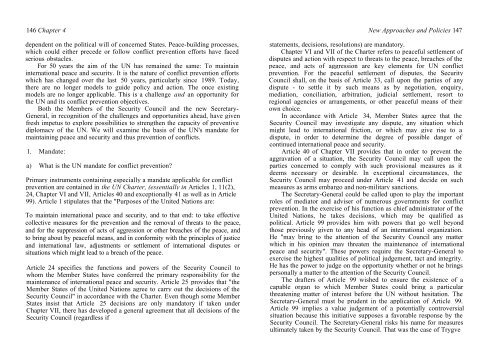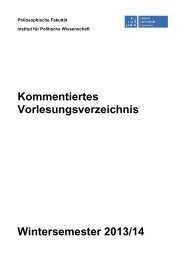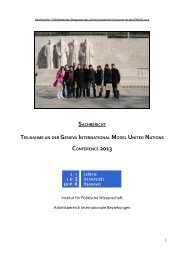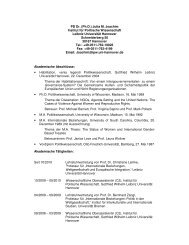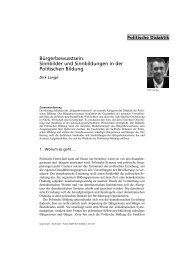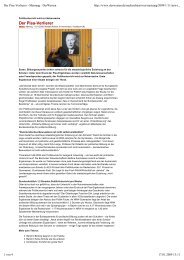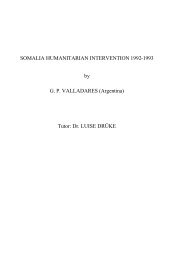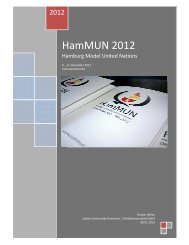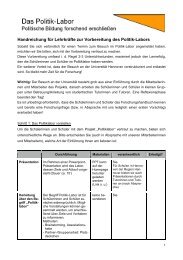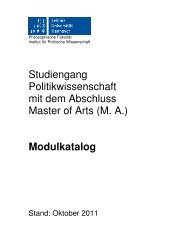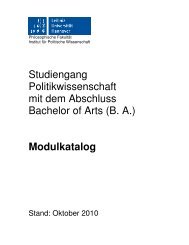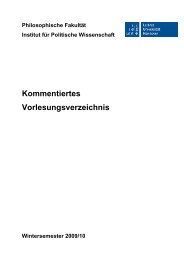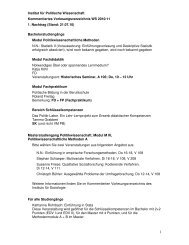Preventive Action for Refugee Producing Situations
Preventive Action for Refugee Producing Situations
Preventive Action for Refugee Producing Situations
Create successful ePaper yourself
Turn your PDF publications into a flip-book with our unique Google optimized e-Paper software.
146 Chapter 4<br />
dependent on the political will of concerned States. Peace-building processes,<br />
which could either precede or follow conflict prevention ef<strong>for</strong>ts have faced<br />
serious obstacles.<br />
For 50 years the aim of the UN has remained the same: To maintain<br />
international peace and security. It is the nature of conflict prevention ef<strong>for</strong>ts<br />
which has changed over the last 50 years, particularly since 1989. Today,<br />
there are no longer models to guide policy and action. The once existing<br />
models are no longer applicable. This is a challenge and an opportunity <strong>for</strong><br />
the UN and its conflict prevention objectives.<br />
Both the Members of the Security Council and the new Secretary-<br />
General, in recognition of the challenges and opportunities ahead, have given<br />
fresh impetus to explore possibilities to strengthen the capacity of preventive<br />
diplomacy of the UN. We will examine the basis of the UN's mandate <strong>for</strong><br />
maintaining peace and security and thus prevention of conflicts.<br />
1. Mandate:<br />
a) What is the UN mandate <strong>for</strong> conflict prevention?<br />
Primary instruments containing especially a mandate applicable <strong>for</strong> conflict<br />
prevention are contained in the UN Charter, (essentially in Articles 1, 11(2),<br />
24, Chapter VI and VII, Articles 40 and exceptionally 41 as well as in Article<br />
99). Article 1 stipulates that the "Purposes of the United Nations are:<br />
To maintain international peace and security, and to that end: to take effective<br />
collective measures <strong>for</strong> the prevention and the removal of threats to the peace,<br />
and <strong>for</strong> the suppression of acts of aggression or other breaches of the peace, and<br />
to bring about by peaceful means, and in con<strong>for</strong>mity with the principles of justice<br />
and international law, adjustments or settlement of international disputes or<br />
situations which might lead to a breach of the peace.<br />
Article 24 specifies the functions and powers of the Security Council to<br />
whom the Member States have conferred the primary responsibility <strong>for</strong> the<br />
maintenance of international peace and security. Article 25 provides that "the<br />
Member States of the United Nations agree to carry out the decisions of the<br />
Security Council" in accordance with the Charter. Even though some Member<br />
States insist that Article 25 decisions are only mandatory if taken under<br />
Chapter VII, there has developed a general agreement that all decisions of the<br />
Security Council (regardless if<br />
New Approaches and Policies 147<br />
statements, decisions, resolutions) are mandatory.<br />
Chapter VI and VII of the Charter refers to peaceful settlement of<br />
disputes and action with respect to threats to the peace, breaches of the<br />
peace, and acts of aggression are key elements <strong>for</strong> UN conflict<br />
prevention. For the peaceful settlement of disputes, the Security<br />
Council shall, on the basis of Article 33, call upon the parties of any<br />
dispute - to settle it by such means as by negotiation, enquiry,<br />
mediation, conciliation, arbitration, judicial settlement, resort to<br />
regional agencies or arrangements, or other peaceful means of their<br />
own choice.<br />
In accordance with Article 34, Member States agree that the<br />
Security Council may investigate any dispute, any situation which<br />
might lead to international friction, or which may give rise to a<br />
dispute, in order to determine the degree of possible danger of<br />
continued international peace and security.<br />
Article 40 of Chapter VII provides that in order to prevent the<br />
aggravation of a situation, the Security Council may call upon the<br />
parties concerned to comply with such provisional measures as it<br />
deems necessary or desirable. In exceptional circumstances, the<br />
Security Council may proceed under Article 41 and decide on such<br />
measures as arms embargo and non-military sanctions.<br />
The Secretary-General could be called upon to play the important<br />
roles of mediator and adviser of numerous governments <strong>for</strong> conflict<br />
prevention. In the exercise of his function as chief administrator of the<br />
United Nations, he takes decisions, which may be qualified as<br />
political. Article 99 provides him with powers that go well beyond<br />
those previously given to any head of an international organization.<br />
He "may bring to the attention of the Security Council any matter<br />
which in his opinion may threaten the maintenance of international<br />
peace and security". These powers require the Secretary-General to<br />
exercise the highest qualities of political judgement, tact and integrity.<br />
He has the power to judge on the opportunity whether or not he brings<br />
personally a matter to the attention of the Security Council.<br />
The drafters of Article 99 wished to ensure the existence of a<br />
capable organ to which Member States could bring a particular<br />
threatening matter of interest be<strong>for</strong>e the UN without hesitation. The<br />
Secretary-General must be prudent in the application of Article 99.<br />
Article 99 implies a value judgement of a potentially controversial<br />
situation because this initiative supposes a favorable response by the<br />
Security Council. The Secretary-General risks his name <strong>for</strong> measures<br />
ultimately taken by the Security Council. That was the case of Trygve


